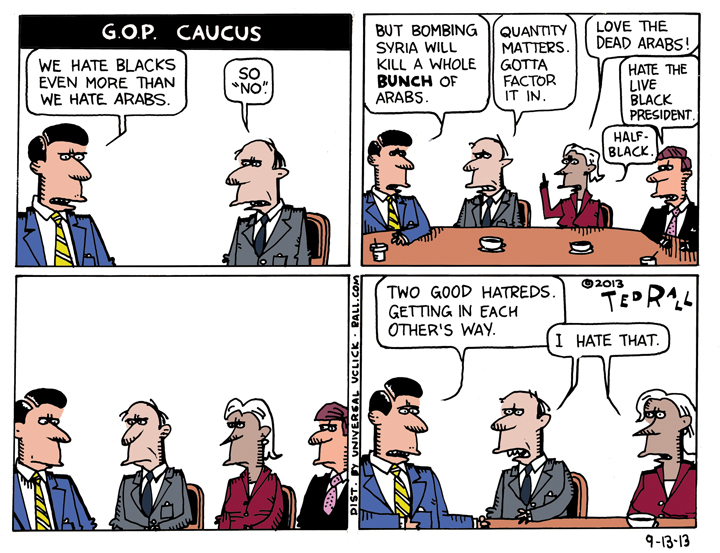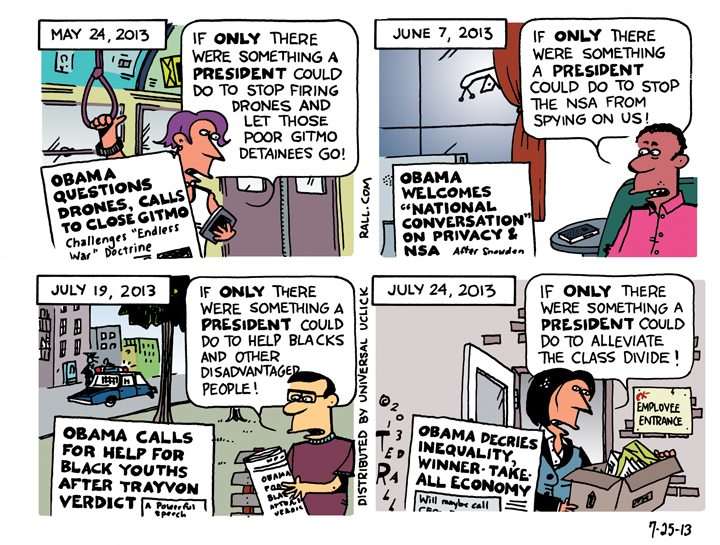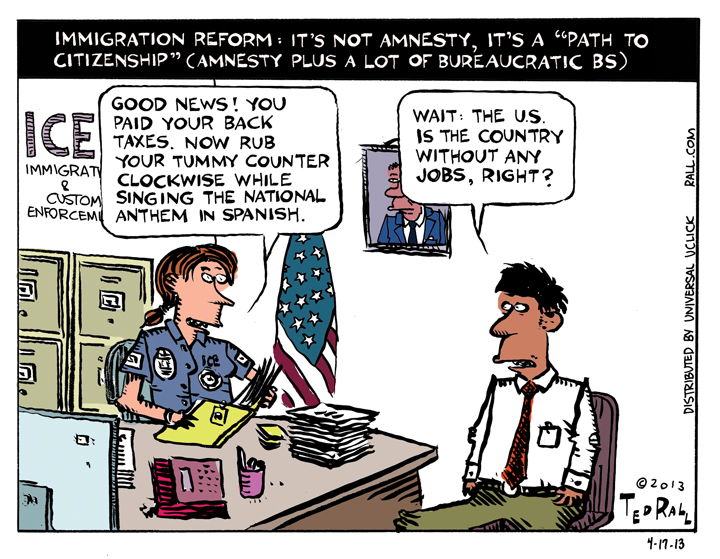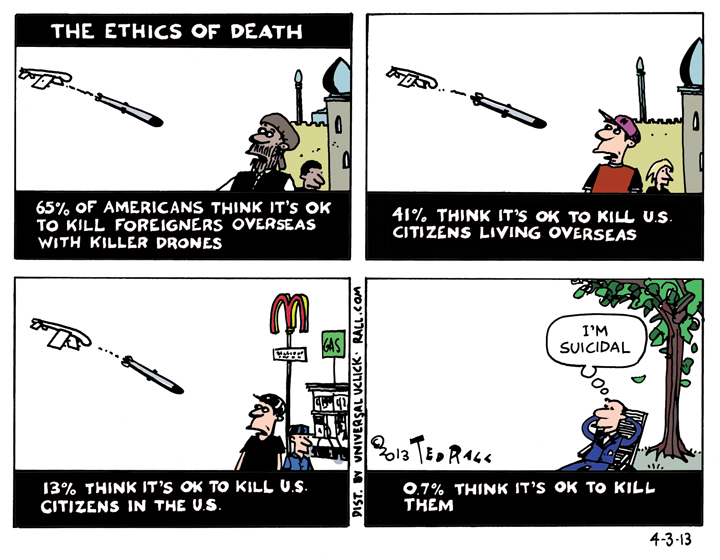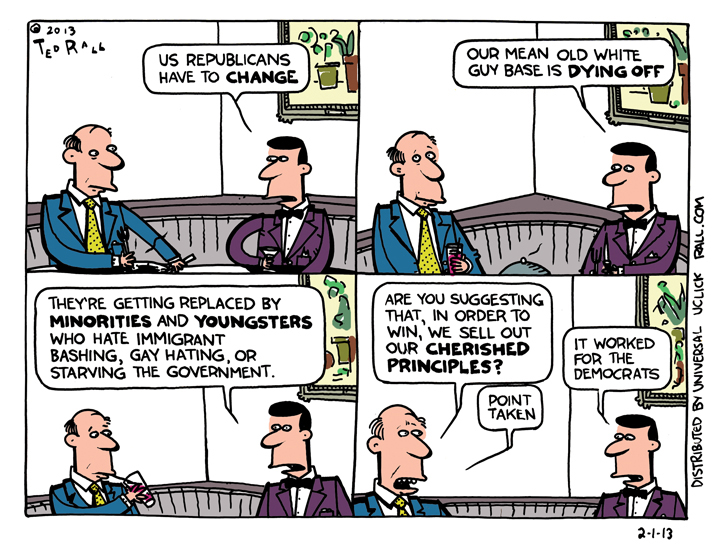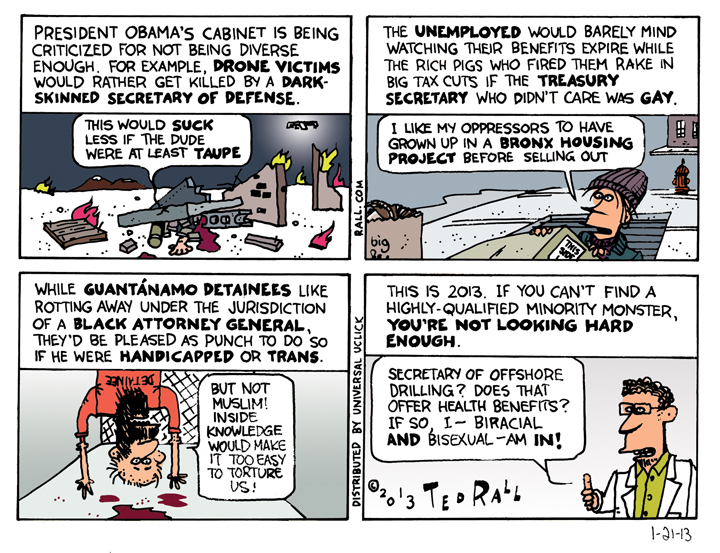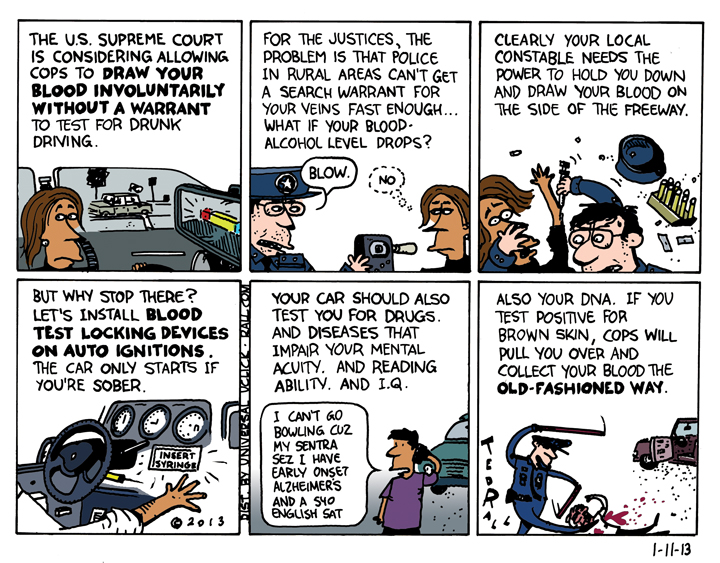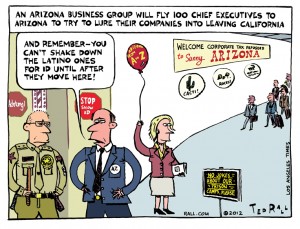While considering Obama’s request for a Congressional authorization to use military force to attack Syria, Congressional Republicans are forced to choose between their hatred of him as a black man and their desire to blow up Muslims.
SYNDICATED COLUMN: To Live and Die in L.A.
An Armed, Disposable and Dangerous System
What’s shocking is that it doesn’t happen more often.
When a heartless system refuses to listen or help, when it crushes and grinds down millions of people day after day, year after year, everywhere, it’s illogical and unreasonable to assume that all its victims will pick themselves up, dust themselves off and reinvent themselves. (Job retraining! Start a business! Win the Lotto!) Some people will crack. Others will explode.
It’s inevitable.
Consider the case of the ex-Los Angeles police officer and Iraq War vet who triggered a massive manhunt after he allegedly shot three people in retaliation for his dismissal in 2008. Based on media accounts so far, Christopher Dorner had reason to be angry. After he reported a partner for assaulting a homeless man, a review board concluded that there wasn’t enough evidence to charge the other cop. Fair enough. Maybe the partner was innocent. But then they went too far, firing the officer who brought the charge for filing a false report.
Officer Dorner had already taken a chance by stepping forward, risking ostracism and the chance to advance in his career. Firing him – even if he was wrong in this case – is heinous.
Anyone familiar with the behavior of white cops in predominantly African-American neighborhoods and who has seen the LAPD in action has to admit that the accusation – kicking a bum – is well within the realm of plausibility. Anyone who has ever faced off against an arresting officer in court knows that cops lie. And anyone who has filed a complaint against the police and their behavior soon learns that the chances of obtaining redress, much less justice, range from slim to none. (Disclosure: I’ve experienced all three.)
Ruling against Dorner in 2010, a Superior Court judge noted that administrative review panels – in this case, the LAPD itself – enjoy a “presumption of correctness” under state law. Which makes suing pointless.
“I have exhausted all available means at obtaining my name back,” Dorner wrote on Facebook. “I have attempted all legal court efforts within appeals at the Superior Courts and California Appellate courts. This is my last resort. The LAPD has suppressed the truth and it has now lead to deadly consequences.”
Los Angeles police officials spun the wanted ex-cop’s Facebook manifesto, which described the force as brutal, corrupt and racist – “The department has not changed since the Rampart and Rodney King days. It has gotten worse” – as out of date, a relic of the 1990s, before the scandal-ridden “old LAPD” got reformed (by good people like them). Unfortunately for their we’re-nice-guys-now messaging, their trigger-happy ground troops were rocking it old-school in their hunt for their former colleague, twice opening fire with assault rifles on vehicles they thought fit the description of the truck driven by the suspect before bothering to take a look at three people inside two cars, none of whom look anything like him yet wound up in the hospital anyway.
To his credit, or at least that of the Police Department’s publicity office, Chief Charlie Beck announced that the LAPD would re-examine Dorner’s dismissal.
How exactly is this going to work? If it turns out the guy was right, and that he never should’ve been let go, does he get his job back while he’s serving three life terms? Confusing. But it sounds good. That’s what matters.
Needless to say, a shooting spree is an inappropriate response to injustice. Still, the case of the cop gone rogue is a parable for our time. Authority is unaccountable. Individuals are powerless. Checks and balances, however well they worked in the past, have evaporated. It’s a system doomed to fail.
Fired or laid off? Chances are, you’re an “at will” employee. That means that, no matter how hard you work and how good you are your job, your boss can fire you. There’s nothing you can do about it. Even if you have the money to sue – and if you have that much money, you probably didn’t need the job in the first place – no honest lawyer will take your case. Employers have all the power. Is it any wonder that wages are stagnant or falling? Who would be stupid enough to dare to ask for a raise?
What happens to people like Officer Dorner, who lose everything? The American system – the government, political leaders, gatekeepers in the media – has no answer.
We live in a disposable society. We are disposable. When our skill set or education or personality or serendipity no longer fits the demands of the marketplace, when we suffer an injury to our bodies or our minds that reduces us to uselessness under the cold capitalist calculus of value-added cost-benefit profit-loss, we get turned out. No income, no home. No status, no life. What should you do? Where should you go? Nobody cares, not even about our so-called national heroes, our sainted troops whom the yellow stickers on our SUVs pledged to support. Every day, 22 veterans commit suicide. Tens of thousands are homeless.
Note to the architects of the American political system: if you’re going to build your economy on the blood and crushed bones of powerless citizens, it’s not the smartest idea to pair disposability of the individual with a cult of militarism that sends millions to war. Every now and then, as in the case of fired officer Christopher Dorner, the victims of your brutalist slave-labor approach to labor-management relations turn out to be heavily armed, highly trained, out to kill – with nothing left to lose.
(Ted Rall’s website is tedrall.com. His book “After We Kill You, We Will Welcome You Back As Honored Guests: Unembedded in Afghanistan” will be released in November by Farrar, Straus & Giroux.)
COPYRIGHT 2013 TED RALL
Worked for Dems
Demographics are changing. Angry old white men are dying. Since they were the base of the Republican Party and younger voters tend to be more liberal on social and other issues, how should the Republican Party adapt? Party stalwarts worry that the GOP might sell out its long-held cherished principles just in order to win elections. On the other hand, the Democrats did that years ago.
Vein Rape
The US Supreme Court is currently considering allowing police to draw your blood involuntarily without a warrant in the event that you refuse a breathalyzer test if you are suspected of drunk driving. It is an incredibly invasive procedure, but the authorities and the courts are siding with the cops because, incredibly, they complained that sometimes it is too difficult to get search warrants for your veins and arteries quickly enough before your blood alcohol level dissipates to legal levels.
SYNDICATED COLUMN: Men of Dishonor
A Congress of 21st Century Cynics Dodges 19th Century Rules
People are calling the recently adjourned 112th Congress “the most dysfunctional ever” and the least productive since the infamous “do-nothing Congress” of the 1940s. There’s lots of blame to go around, but one cause for congressional gridlock has gone unnoticed and unremarked upon: we no longer have a sense of honor.
Back in the late 18th and 19th centuries, when our bicameral legislature and its rules were conceived of by a bunch of land-owning white males, a gentleman’s word was his most precious asset. Integrity and the lack thereof were literally a matter of life and death; consider the matter of Alexander Hamilton and Aaron Burr. As Thomas Jefferson and his de facto wife Sally Hemings could attest, civility was far from guaranteed under this old system. It certainly could have worked better for Charles Sumner, the abolitionist Massachusetts senator who was nearly beaten to death by a proslavery colleague on the floor of the Senate in 1856. (He was avenging what he considered libelous rhetoric against his family.)
Though less-than-perfect, there was a lot to be said for a culture in which a person’s word was his bond, legalistic quibbling was scorned, and a legislator was expected to stake out and defend a principled position, even in the face of political and personal adversity.
It’s hard to imagine the “fiscal cliff” showdown unfolding in the 1800s or even the first half of the 1900s for two simple reasons. First, the general fiscal health of the country would have come ahead of partisanship. Second, and more importantly, members of the two political parties would have stuck to the deal that they struck a decade earlier. When George W. Bush and his Republicans pushed for a set of income tax cuts that primarily benefited the wealthiest Americans in 2001, they argued the standard GOP trickle-down economics talking point that the tax cuts would pay for themselves by stimulating the economy so much that revenues into government coffers would more than make up for the cost. In order to get enough Democratic support for passage, the Republicans agreed to a five-year time period, after which taxes would revert to their Bill Clinton-era levels.
By 2006 there was still no evidence to show that the tax cuts had stimulated the economy. In fact, by many measures, things were worse. The housing bubble was beginning to burst; unemployment and underemployment had increased. If this had been the 19th century, Republican legislators would have acknowledged that their experiment had failed and that would have been that. A gentleman didn’t run away from the facts or his mistakes.
Voters seemed to agree. Unhappy with the invasion of Iraq as well as the state of the economy, Americans returned Democrats to control of Congress in 2006. Republicans had a pretty good idea—the polls were damning—that their unpopular policies were driving them toward a decisive defeat in the midterm elections. For men and women of honor, this would have been a time to reassess and back off.
Nevertheless the GOP jammed through an extension of the 2001 Bush tax cuts for the wealthy months before the midterm election. No honor there.
Here we are nearly 12 years later, and the verdict is in: the Bush tax cuts failed miserably. No doubt about it, it’s absolutely ridiculous that President Obama and the Democrats agreed to extend them for all but the richest one-half of one percent of American income earners. But the debate should never have gotten this far in the first place. Had the Republicans who proposed it in the first place possessed an iota of good old-fashioned 19th-century honor and integrity, this misbegotten legislative abortion would have died in 2006.
Robert’s Rules of Order and other quaint traditions of parliamentary procedure don’t translate to a quibbling little time like ours, when White House lawyers torture widely understood words like “torture” and “soldier” or claim that a US military base in Cuba is in no man’s land, neither in Cuba nor under US control, and that members of both major political parties say anything in order to get their way. Consider, for example, the current push to reform the filibuster, in order to clear the logjam on judicial nominations and other business that used to be considered routine.
The Senate, the only house of Congress that permits a filibuster, draws upon a tradition of principled minority protest that goes back to Cato in ancient Rome. Until the 1970s, filibusters were a rarity, averaging one a year. Senators viewed them as a bit of a nuclear option and only considered deploying a one-man block on debate of a bill a few times during a long political career, to take a stand on an issue where he felt it mattered most. Now the filibuster is not only a daily routine but gets deployed in an automated way so that the Senate has effectively become a body in which nothing gets done without a 60% vote in favor.
Everyone in the Senate understood what filibusters were for. No one abused them. It was a matter of honor.
But honor is too much to ask when even the most basic of all political considerations—ideology and party affiliation—bend like a reed in the winds of change.
Last week the Republican governor of New Jersey and a Republican congressman from Long Island, New York were so incensed by their party’s refusal to approve disaster relief funds for their states after hurricane Sandy that they went public with disparaging remarks about the Republican leadership in Congress. Fair enough. Standing up for your constituents against rank parochial self-interest is what integrity is all about.
On the other hand, the immediate willingness of some so-called liberal and progressive Democrats to welcome Chris Christie—a Tea Party favorite—and Peter King—a notorious nativist and anti-Muslim bigot—into their party’s ranks indicates a willingness to overlook basic principles that would have startled most self-described gentlemen of a century or two ago, much less those who’d entered public service. Back then, of course, the American political party system wasn’t as settled as it is today, so there were mass changes of party affiliation as parties appeared, metastasized and vanished. Still, it wasn’t acceptable behavior to change parties over a minor spat like the hurricane aid or for a party to accept members who didn’t adhere to its principles.
It’s almost enough to make you wish for a duel.
(Ted Rall is the author of “The Book of Obama: How We Went From Hope and Change to the Age of Revolt.” His website is tedrall.com.)
COPYRIGHT 2013 TED RALL
LOS ANGELES TIMES CARTOON: Arizona Gives the Business
I draw cartoons for The Los Angeles Times about issues related to California and the Southland (metro Los Angeles).
This week: An Arizona business group will fly 100 chief executives to Arizona to try to lure their companies into leaving California.

